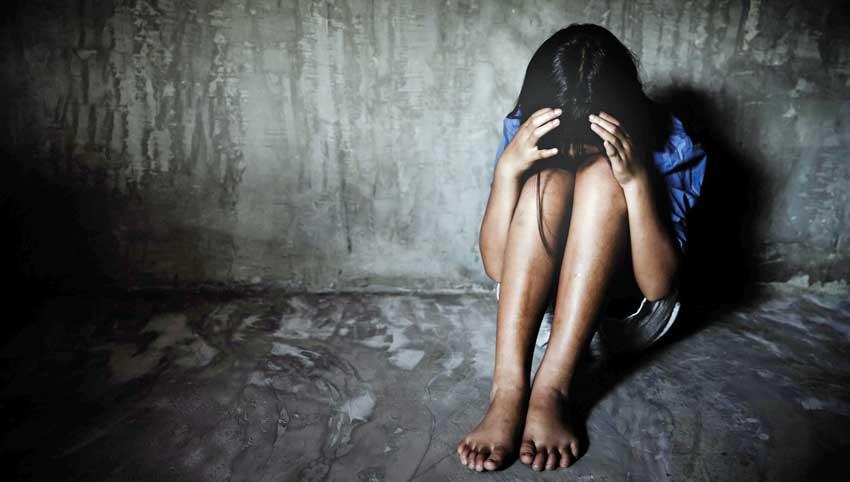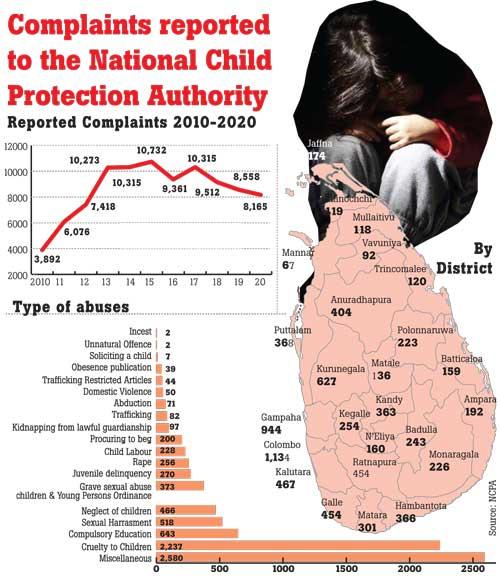Reply To:
Name - Reply Comment

Despite many preventive measures child abuse is rampant in the country as helpless mothers watch helplessly
Panel discussion on child abuse highlights several loopholes in the system
 “What did I do, why do I suffer? Always a why, but never an answer” - Child Victim
“What did I do, why do I suffer? Always a why, but never an answer” - Child Victim
When a child is physically harmed or sexually abused, the ideal response is for doctors to treat injuries, therapists to counsel the child, law enforcement officers to arrest the offender, and attorneys to prosecute the offender.
This is possible only if the Government agencies and organisations involved have an established process in place for collaborating when it comes to handling child abuse-related cases.
Looking at the number of child abuse cases reported in recent times, it is shocking to realise how serious the issue had become.
Departments and Ministries are established to protect children but we as a society have failed in many cases.
Then, why have we failed to protect our children? Where did we go wrong?
Responding to a question during a recently held panel discussion, Director of the Child & Women Bureau of Sri Lanka Police SSP Dharshika Ranasinghe pointed out a key issue that the officials had so far failed to address, when ensuring the safety of a child during legal proceedings.
“There are no laws to say that a child who was sexually abused or harassed should be separated from their accused perpetrator,” she said.
 “This serious lapse in the legal system is why we see these victimised children having to go back to unsafe homes or environments whith their perpetrators.
“This serious lapse in the legal system is why we see these victimised children having to go back to unsafe homes or environments whith their perpetrators.
“In most cases, it would either be their own father or a family member, who also lives with them until any legal proceedings are concluded.
And that can sometimes take months or even more time.”
“In most cases, the families will not come forward to report these incidents to the Police out of embarrassment or financial constraints since, in almost all households it is the father, the accused perpetrator, who usually provides for the family. The mothers mostly decide to keep quiet for the sake of the family’s financial future,” she added.
She shared her views during a panel discussion held at the launch of the Youth-Led Participatory Study on the Impact of COVID-19 on Child Protection and Psychosocial Wellbeing of Children and Youth, organized by the Alliance of Youth for Ending Violence Against Children’ (AYEVAC) and ChildFund International Sri Lanka.
The study conducted to ascertain the level of impact of COVID 19, on children and youth was presented at this virtual symposium under the auspices of Director of the Child & Women Bureau of Sri Lanka Police SSP Dharshika Ranasinghe, Deputy Commissioner of the Department of Probation & Childcare Service Sudheera Vithana, Assistant Director (Psychological) of National Child Protection Authority Mrs. Priyangika Ratnayake and Director (Development) of State Ministry of Women & Child Affairs Mrs. Iresha N. Dharmasena.
In most cases, the families will not come forward to report these incidents to Police out of embarrassment or financial constraints since, in almost all households it is the father, the accused perpetrator, who usually provides for the family. The mothers mostly decide to keep quiet for the sake of the family’s financial future
Conducted over a month and amidst practical challenges posed by the current pandemic, the study saw the collective effort by 58 AYEVAC youth leaders representing Nuwara-Eliya, Trincomalee, Batticaloa, Matale, Puttalam and Moneragala.
Their alarming findings and crucial recommendations came at a time when growing concerns on the safety and wellbeing of children and adolescents across Sri Lanka were highlighted during the COVID-19 pandemic and its consequent lockdowns.
The AYEVAC conducted its extensive field assessment with the involvement of 571 children and youth that included 281 girls.
In the research, questionnaires were not used. Instead, the youth leaders identified specific areas of inquiry to facilitate a free flow of conversation. Discussing their findings during the webinar, youth leader Sewmini Nirma highlighted that cases of sexual abuse and harassment, especially related to girls, are on the rise during the pandemic.
Conducted over a month and amidst practical challenges posed by the current pandemic, the study saw the collective effort by 58 AYEVAC youth leaders representing Nuwara-Eliya, Trincomalee, Batticaloa, Matale, Puttalam and Moneragala
“Our findings came with safety concerns of the girl child and young women, especially due to the extended use of the Internet and social media platforms during lockdowns. We saw how young men took this as an opportunity to harass girls they knew. In many cases, young girlfriends were targeted by their own boyfriends,” she explained.
In Moneragala, a girl child had been sexually abused by her father while in another instance a girl with a disability was abused by a friend of her father.
The findings, however, showed that women were not alone in this large scale safety issue. Youth leaders also came forward with details of a young boy who was sexually abused by a man in one of the districts in which the study was conducted.
Youth leader Lahiru Perera emphasised the need to immediately educate the girl child across Sri Lanka on their child rights including sexual rights, equality between men and women, ethics related to digital communication and the importance of being law-abiding citizens.
“We recommend that Government bodies, NGOs and civil society organizations must come forward to protect girls who are at the risk of violence,” he said.
“There is also a prompt need for a comprehensive national action plan on ensuring the safety of girls and women. We further believe that this discourse on the safety of children, especially girls, should be included in the school curriculum so that this will become a part of children’s daily conversations,” he said.
Meanwhile, findings of the AYEVAC leaders also drew attention to the increased consumption of alcohol and illicit drugs during the pandemic by children and adolescents.
They note how the shutdown of liquor stores during the lockdowns led to illegal production of illicit alcohol across many of the districts and also how adults had involved children for both production and distribution of illicit liquor or drugs during this time.
This led to children being exposed to certain dangerous avenues.
Youth leader Rockshanthan, who represented the Nuwara-Eliya District during the panel discussion highlighted several key challenges when conducting their survey during this phase.
“What was interesting is that we had to face protests by illegal alcohol/drug distributors and their customers at first. Parents were hesitant to cooperate with us. We also found how children had trouble opening up when speakng about these issues as well,” he said.
Youth leader Thanusiya, who represented the Batticaloa District stressed the significant need to impose strict legal action against illicit liquor and drug traffickers, in an attempt to protect the vulnerable members of the community.
“Apart from directing these young illicit drug and alcohol addicts to reform at rehabilitation centres, it is important to properly inform parents and children on the fight against drugs and alcohol,” Thanusiya recommended,
“We also recommend updating the education methods for children living in rehabilitation centres and children’s homes across Sri Lanka,” she said.
The AYEVAC had also witnessed the sudden increase of corporal punishment cases during the pandemic, which were of grave concern a decade ago but were considerably reduced after stringent intervention by CSOs and NGOs over the years. These violent punishment methods, however, are on the rise now.
In the Batticaloa District, several incidents had been reported in which, school teachers and Principals had adopted corporal punishment methods on students.
This had resulted in arguments between the parents and school administrators, which later involved legal interventions.
There had also been incidents where young boys had committed or attempted to commit suicide owing to severe punishment meted out by parents, for reasons such as puppy love or bad grades.
Some boys had left their homes and education behind because of abusive fathers, only to find daily wage employment to survive.
Youth leaders Nonish and Tharshana who also represented the Batticaloa District stressed their recommendations to mitigate this violence against children.
“There is a need to make parents and teachers aware of the mental as well as physical implications of these types of punishment on children while Government bodies, NGOs and civil society organizations must take action against such cases.
It is also high time to educate all relevant parties on the positive upbringing of children,” they emphasised.
While commending the efforts by these young leaders, Assistant Director (Psychological) of the National Child Protection Authority Mrs Priyangika Ratnayake assured that they would add these recommendations when implementing the proposed National Policy on the Prevention of Child Abuse.